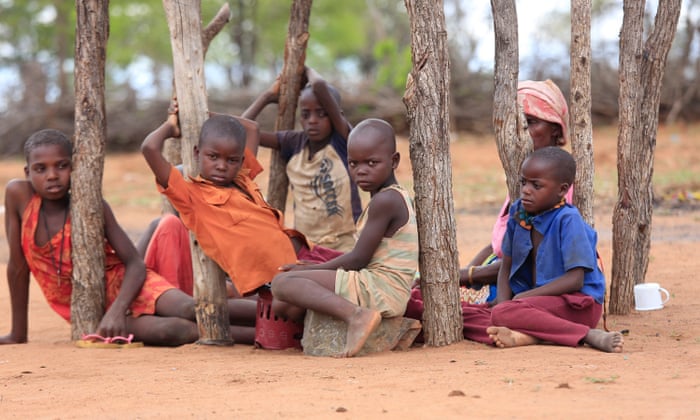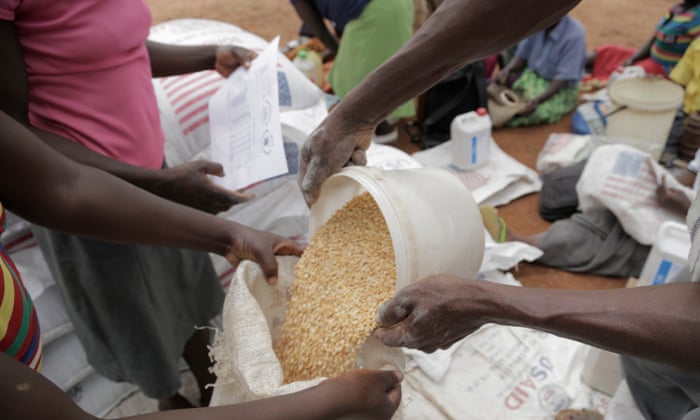Zimbabwe, Where Hunger Stalks
"Inflation is a rampant problem and people said, 'We'd prefer the food."
"[This month the World Food Program plans a switch to a] fully in-kind food program [for the first time, to distribute monthly rations of grain, oil and nutritional supplements for children under five]."
"The weather forecasts are basically saying we're looking at a very dry growing season."
Gerald Bourke, spokesman, southern Africa operations, World Food Program
"Life is hard, all things are expensive, there are no price controls and inflation just keeps getting worse."
"The money here is valueless now."
Benjamini Dunha, 57, plumber, Harare
"I cannot stress enough the urgency of the situation in Zimbabwe."
"[Sixty percent of the country's 14 million people are] food-insecure, living in a household that is unable to obtain enough food to meet basic needs."
Hilal Elver, United Nations human rights expert on food security
"We used to buy favourite foods, such as ice cream, cheese, bacon, sausages and ham, and prepare good breakfasts for our families."
"These things are a vision of the past now."
Moreblessing Nyambara, 35, Harare schoolteacher
"This is not just a food crisis. It is a wider, more complicated situation."
"People have to make choices: Do I seek H.I.V. treatment or food?"
Ursula Mueller, deputy emergency relief coordinator, United Nations
 |
| Children in Mafomoti village, in Zimbabwe’s Mwenezi district, wait while their mothers prepare their only meal of the day. Photograph: Aaron Ufumeli/EPA |
This is former President-turned-tyrant Robert Mugabe's legacy for Zimbabwe. He began as an African independence hero, wresting his country from British colonial rule, transforming Rhodesia into the independent Republic of Zimbabwe. Freedom fighter to President, he then became a dictator, ruling like an African potentate. White farmers who had remained in Zimbabwe after independence, who considered themselves citizens, and whose farming expertise helped Zimbabwe become an African cornucopia of produce sufficient to feed its population and trade the surplus, became targets of land confiscation.
The 'freedom fighters' whose exploits as Mugabe entitled stalwarts were given title to confiscated farms. Black Zimbabweans who had worked on the white-owned farms found themselves out of work, and Mugabe's friends who then owned the farms were disinterested in farming, knew nothing about it and cared less, and the land went fallow. From that point on, food became scarce and was imported, inflation rose, the Zimbabwean currency became useless, unemployment soared.
The more recent droughts that have impaired crops and created even greater scarcity of food arrived at a time when Zimbabwe's new president, Emmerson Mnangagwa, who had been an ally of Mugabe, was ostensibly attempting to turn the economy around, and bring stability back to the country, but he doesn't appear to be much less of a despot than his predecessor, and just as haplessly corrupt in his inept administration.
Food aid is desperately needed. The crisis is being attributed to southern Africa's climate crisis, with drought conditions ensuring fewer crops to harvest. With insufficient nutrition people's health declines and crime increases along with other "negative coping mechanisms", according to Ursula Mueller of the United Nations. Basic maladministration, corruption and gross incompetence come to the fore in Zimbabwe, just as it all does in all too many areas of the African Continent.
People line up, anxious and early for the opportunity to buy subsidized maize meal offered by the government-operated Grain Marketing Board depot. Affordable prices for many, enabling them to have food for their families. So hundreds of people patiently wait in line for hours until a guard exits the depot to announce that the supply is rotten, removing it for sale for the day. Frustratingly enraging; is the food going elsewhere, and the story being circulated untrue? They will never know.
Benjamin Dunha earns 700 Zimbabwe dollars monthly as a plumber, the equivalent of $38 at official exchange rates. His salary less than a year earlier was worth closer to $700.00. He has eight children to feed. He has been able to provide them with vegetables and sadza, a thick porridge of boiled maize meal. Now that porridge will be absent until he is able to find another source.
Hunger haunts Africa. In Zimbabwe, the annual inflation rate is the world's highest, at 300 percent, according to the International Monetary Fund. Buying any food beyond maize meal is considered a luxury. The World Food Program plans to double the number of aid recipients in Zimbabwe to four million, this year.
 |
| A woman pours food aid into a sack at a distribution point for Mafomoti primary school in Zimbabwe’s Mwenezi district. Photograph: Aaron Ufumeli/EPA |
Labels: Corruption, Food Scarcity, Inflation, Maladministration, Poverty, Unemployment, Zimbabwe
0 Comments:
Post a Comment
<< Home